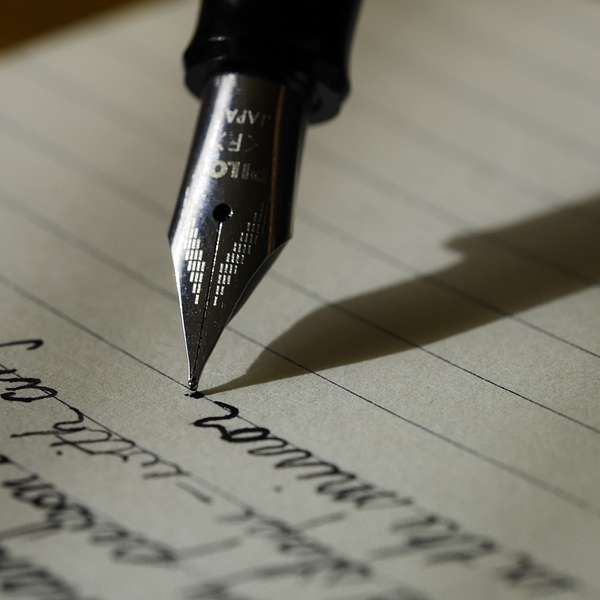
Tracks for the Journey
Tracks for the Journey will improve your well-being with practical insight and inspiration from progressive Christian spirituality, positive psychology, and justice ethics. Your host is Dr. Larry Payne, a minister, chaplain, and counselor with more than 45 years experience helping people with discoveries on their journey of life. He believes well-being is founded on balanced self-awareness, quality relationships, and active spirituality. Access all the resources of the Network at www.tracksforthejourney.com.
https://hopp.bio/tracksforthejourney
Tracks for the Journey
Diary Your Way to Well-being
This episode is only available to subscribers.
Tracks for the Journey Premium
A subscription unlocks 25+ subscriber-only premium episodes and new ones too!How can 2023 be a better year for you mentally, socially, and vocationally? A simple tool is keeping a therapeutic journal. You can discover insights and improve your life with just a few minutes each day. Explore with me the benefits and practical methods that will guide you to diary your way to well-being.
Subscribe to this podcast for only $5 per month to get a monthly bonus episode, access to exclusive subscriber-only episodes, and the POSTINGS weekly newsletter on Substack with more resources for well-being!
Subscribe at https://tracksforthejourney.buzzsprout.com
Enjoy the Youtube Channel at https://www.youtube.com/@tracksforthejourney77
Welcome to TFJ, the program dedicated to your well-being through progressive Christian spirituality, psychology, and science. Today’s episode is “Diary your way to better well-being,” available on the Youtube channel and the podcast.
Many years ago, when I was a searching and fairly confused 14 year old, I began to keep a diary. I found a large, hardback ledger book with 200 lined, blank pages, ready for my innermost thoughts. It gave me a secret place to record my experiences. Many years later I reviewed my musings. Stories of athletic strivings, complaints about friends, spiritual commitments which I vowed would last a lifetime, and—would you believe perhaps a subject with more words than any other—girls. My scratchings tended to be after a good date or great achievement, then silence for weeks. I was not a teenage literary prodigy.
Have you ever kept a journal or diary? Do you keep one now? Today the episode is entitled, “Dare to Diary.” I’d like to explore how this habit could contribute to your quality of life, as shown by the latest research. Stay with me for a few minutes as we make some tracks by daring to record the adventures of our own lives.
The earliest examples of writing are found in Sumeria, which is the fertile area near modern Baghdad. Clay tablets used for commerce dating to 3000 BCE are numerous. Some scholars believe fragments found in China with symbols may date to 5000 BCE. Around 550 BC God gave a Hebrew prophet named Jeremiah specific instructions, “Write in a book all the words that I have spoken to you.” History also holds the diary of the Roman Emperor Marcus Aurelius, who kept his personal diary around AD 170. Marco Polo published a huge bestseller around 1275 AD about his amazing journey from Italy to China. In the 1700’s, publishers found an interest in printing the diaries of famous people and that has continued to now. Have you ever heard of a journalist and African explorer named Henry Morton Stanley? If not, perhaps you’ve heard the phrase, “Dr. Livingstone, I presume?” Dr. Livingstone was a British explorer and missionary who explored central Africa in the 19th century. He had been missing for nearly 5 years when Stanley found him and informed the world the hero was alive. It was because Stanley and Livingstone kept extensive journals of their adventures that they were able to publish them for an enthralled world to read. Closer to our time, all of us have heard of the diary of Anne Frank, Holland’s teenage victim of WW2. In the modern world, Michelle Obama’s memoir entitle Becoming is still on the best seller lists.
You may be saying, ‘That’s interesting, Larry. I woke up this morning wondering about the history of diaries and journals.’ Dear listener, I get what you are saying. But there may be more in this subject than you think. We may find something that is grounded in modern psychology and your own well-being. That sounds interesting, doesn’t it?
We’re discussing the value of keeping a journal or diary. My history lesson focused on famous people who have kept a diary. But common folks like you and me can benefit from doing the same. A family treasure around my house are the journals kept by my mother-in-law, Ruth. At her passing the family shared more than 50 years of her notes about the day-by-day activities of her life and family. The small notes of family events, her thoughts on the great happenings of the world, spiritual insights and even some juicy gossip left a legacy for her family.
In a much darker way, diaries sometimes are kept by criminals. In 1959 four members of a Virginia family were abducted and murdered. A tip led police to search the residence of a hobbled, 26 year old jazz musician named Melvin Rees. In his saxophone case they found a journal detailing the crime and sadistic torture of the victims. Newspapers called it the “Death Diary.” Psychologists believe these criminal cases show a desperate need to control in order to establish power and identity. Rees was convicted and died in prison 35 years later.
Modern science has found that journal keeping can do far more for our lives than just being a record of this event or that special occasion. We can actually have better emotional health by keeping a journal of our thoughts, feelings and actions. After the break, let’s zero in on the kind of diary that can improve your life.
Let’s talk about a specific kind of diary, called a therapeutic journal. This specialized practice has been shown in numerous studies to be beneficial. The scientific work began with a New Jersey psychiatrist, Dr. Ira Progoff. He directed his patients to write extremely detailed narratives of their lives, dreams, and insights. Many were helped and the idea spread. Today, a majority of mental health professionals use journal writing to develop self-awareness and promote growth. Conditions like depression, PTSD, anxiety, adjustment disorders and others are addressed with journal therapy and the guidance of a mental health professional.
I talk to my counseling clients about the development of self-awareness as they reflect on events and, more importantly, their emotions and thought patterns. Writing often releases emotions long buried in memories. Reviewing entries across the months past can reveal patterns of behavior that are blocking progress. Insights can emerge that are life changing!
Psychologist James Pennebacker studied expressive writing. He reported that evidence is showing, “writing about traumatic experiences for as little as 15-20 munutes a day can produce measurable results in physical and mental health.” [quoted in Brown, Daring Greatly].
In a recent article for RunnersWorld.com, Olympian runner Molly Huddle describes the effect her journal keeping has had for her. She logs by hand every detail of her training workouts and her personal life. She says it makes her slow down and think through what has happened. Reviewing her entries enabled her to set new personal records and become one of America’s greatest female runners.
Okay, I hear your objection. “Larry, I’m not a writer. I misspell every other word. I have 3 kids to get to bed every night. I can’t write a diary.” Hang on. I’ll give you some helps
There are many ways to keep a journal. For you non-writers, the app Daylio, (D-A-Y-L-I-O) provides icons to record your moods, activities and ideas. You are prompted with key questions and tap the icons, emojis and symbols to make a visual record. You don’t need to write a word if you don’t want to do so! It’s incredibly easy and free! You can review and automatically analyze what’s happened in the past. Yes, you can write entries too for extra details.
Another app that is frequently recommended for persons in a hurry is ‘The Five Minute Journal’ by Intelligent Design. With an easy morning and evening prompt, and spaces for pictures, you can build a great diary for change. It does cost about $5 per year.
Now, here’s my simple outline for those who are freelancers. Take a notebook page or open a document and focus on three simple areas: Event, Express, and Engage. First, tell about one event or more in simple details. Next, express your feelings, thoughts and reactions. Finally, engage in growth by applying a lesson or insight from the day that will help you. Event, Express and Engage. Review this at the end of the month and you’ll be amazed at the results.
Here’s another idea. I call it Free Journal. Take a piece of paper and spend five minutes writing whatever is on your mind. Just let it come out without judgment, editing, or even proper punctuation. Next, take five minutes and reflect on what you’ve written. Think about further meanings and what your narrative might provide about insights for your life. Finally, tear up the page and throw it away. Don’t keep it for decades like I did! Why? So you can be completely honest about what you write no mater how difficult, negative, or revealing it is. Just keep the insights, lessons, and process, not the paper.
#
Here’s my confession: I’ve kept a diary of some kind for more than 45 years. I recently used my day-by-day diary from 1976 to write a book-length memoir of a year that changed my life. It was the year to finish my theological studies, seek a place of ministry, grow in a marriage, and start a family. The diary brought those memories alive in technicolor detail. I found neglected truths about myself from way back then that brought insights for today.
Here's one of the insights I was able to resurrect from those long-ago notes, with a dash of literary reflection. I’m quoting from my memoir, Journey to Friendship.
(Excerpt read)
You’ve heard about the many people who have kept a journal. The benefits of a therapeutic journal are proven by careful research. Now, it’s your turn. Start writing today!
Podcasts we love
Check out these other fine podcasts recommended by us, not an algorithm.

The Bible For Normal People
Peter Enns and Jared Byas
Hidden Brain
Hidden Brain, Shankar Vedantam
The Happiness Lab with Dr. Laurie Santos
Pushkin Industries